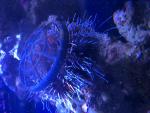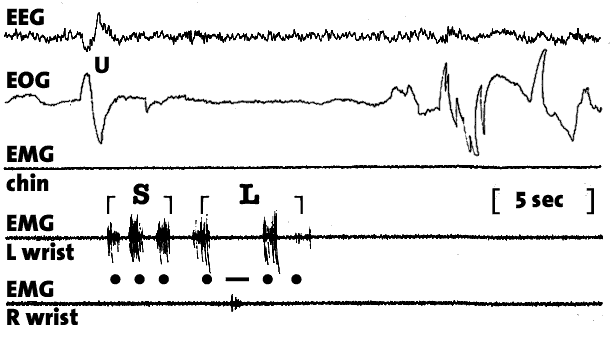Gosh, heated discussion |
|
Results 51 to 58 of 58
Thread: Work Area for SP sticky thread.
Hybrid View
-
10-05-2012 03:26 PM #1Member Achievements:










- Join Date
- Jun 2011
- Gender

- Location
- Lost in the World
- Posts
- 1,935
- Likes
- 2528
- DJ Entries
- 47
Last edited by zoth00; 10-05-2012 at 04:24 PM.
-
10-07-2012 06:41 PM #2
And from that same source which you conveniently left out...
Ok, that's all I want to add, there seems to be a real misunderstanding in the information you provided regarding the nervous system and the impact of paralysis on the skeletal system and actual movement (not just muscular twitches). Ok...done here.These and related studies show clearly that in REM sleep, dreamed bodily movements generate motor output equivalent at the supraspinal level to the patterns of neuronal activity that would be generated if the corresponding movements were actually executed. Most voluntary muscles are, of course, paralyzed during REM, with the notable exceptions of the ocular and respiratory muscles. Hence, the perfect correspondence between dreamed and actual movements for these two systems (Figs. 1-3), and the attenuated intensity (but preserved spatio-temporal pattern) of movements observed in Figure 4.
These results support the isomorphism hypothesis (Hobson et al.) but contradict Solms's (1995) notion of the "deflection" of motor output away from the usual pathways, and his speculation that it isn't only the musculo-skeletal system that is deactivated during dreams, but "the entire motor system, including its highest psychological components which control goal-directed thought and voluntary action." (Solms 1995, p. 58) I believe Occam's Razor favors the simpler hypothesis that the motor system is working in REM essentially as it is in waking, except for the spinal paralysis; just as the only essential difference between the constructive processes of consciousness in dreaming and waking is the degree of sensory input. See LaBerge (1998) for details.
-
10-05-2012 05:57 PM #3Administrator


 Achievements:
Achievements:








- Join Date
- Jul 2007
- LD Count
- 2500ish
- Gender

- Location
- Idaho
- Posts
- 4,838
- Likes
- 5875
- DJ Entries
- 420
Zoth00, me and sageous (he PMd me on it) completely agree with you that this should be kept simple. My first attempt at finding a middle ground was to provide the data Nina wanted, but using a small text size. This is to show that you can skip the science stuff if it is not interesting to you. I probably will break the intro into two posts, the first being very very simple, it would end roughly where I put large bold print in. The second containing the rest.
At this point I will likely not make any large revisions to the text, but I want to invite you to be one of the contributors. I am only at 4 opinions so far. You seem well spoken and clear, so you can be one of the 'opinions,' if you want.
I will compile the first go at this thread today, and sticky it in the DVA for the moment. Then, after seeking the opinions of any active staff that cares,, it will be stickied in the WILD section, if deemed suitable.
Thanks again zoth00. Also, thanks for the confermation on movement in REM. I was sure Gab, me and Sageous were correct, as I have first hand experience, but getting doubters to believe us is much easier with data, like you provided. It can be much more movement than forearm twitching too. Gab moved one arm up to her chest and then the other. I have been able to slowly reach out and hit the snooze button, or shift positions if I get a cramp. Movement like that has a risk of waking me, but I feel it is a skill that improves with time. We are talking slow gentlle volentary movements, but clearly we are not unable to move. If I do not care about waking myself I can move at will, like the DJ link where I sit up in bed to test REM atonia.Last edited by Sivason; 10-05-2012 at 09:52 PM.
-
10-05-2012 06:15 PM #4Administrator


 Achievements:
Achievements:









- Join Date
- Oct 2011
- LD Count
- 306 events
- Gender

- Location
- California Republic
- Posts
- 9,589
- Likes
- 10634
- DJ Entries
- 787
-
10-05-2012 09:51 PM #5Administrator


 Achievements:
Achievements:








- Join Date
- Jul 2007
- LD Count
- 2500ish
- Gender

- Location
- Idaho
- Posts
- 4,838
- Likes
- 5875
- DJ Entries
- 420
Agreed then. I am closing the work area thread. I will compose a first draft of the thread today in thhe DG section, and have MelanieB proof it and adjust it as needed. We also must think about our many members with limited English skills.
Zoth00, if you want to contribute an opinion, please PM it to me and it can be added to the thread. Thanks.
-
10-05-2012 09:56 PM #6Administrator


 Achievements:
Achievements:








- Join Date
- Jul 2007
- LD Count
- 2500ish
- Gender

- Location
- Idaho
- Posts
- 4,838
- Likes
- 5875
- DJ Entries
- 420
One post from each contributor will be moved from this thread, so I cann paste their opinions into a post that is from them. This will allow people later to read the profile of each person, if they wish.
-
09-26-2012 07:57 PM #7high mileage oneironaut Achievements:











- Join Date
- Jun 2011
- LD Count
- 40 + Yrs' Worth
- Gender

- Location
- Here & Now
- Posts
- 5,031
- Likes
- 7160
I feel like I'm not working fast enough, so I swiped a couple of paragraphs from my DVA WILD class about the "noise." I don't think its enough, but I'll try to add more or get rid of unnecessary crap shortly.
Let me know if I'm at least playing in the right court, though, or if I should be mentioning something else. Fair warning -- there's an excellent chance I'll wake up tomorrow with an actual idea and change everything (not the concepts, of course; just the words)!
Here we go:
First, I have had many thousands of WILD's, and never once cared about SP, much less looked for it. No one should.
SP is not a mystical or unusual event by any measure because REM Atonia happens naturally every time you are in REM -- it must occur, or else we’d all be flailing about in our beds, or sleepwalking, or shouting, or … well, you get it. That you are consciously aware of it because it remained switched on a bit too long or switched on early does not make it special, unless you consider your ability to defy nature and notice it something special -- which is a pretty cool thing, I suppose.
SP is also not a goal in WILD. Let me repeat that: SP is not a goal in WILD. One more time for the back rows: SP is not a goal in WILD! You should never, ever, be trying to “achieve SP” if your ultimate goal is lucid dreaming. To do so is to elevate a normal condition of sleep to a point where it is all you pay attention to, and then, invariably, your chances of LD’ing will fade behind the empty excitement of SP.
It is critical for WILD that you understand that SP is not dangerous: it is not an invasion by monsters, or your body failing you, or a break from reality, or any of the other things noted on the forums by breathless dreamers who encounter SP unprepared. It is just a natural bodily function that you happen to notice because you possess waking awareness at a time when nature never intended you to be awake. So if you ever encounter SP (I rarely do) just relax, acknowledge it, and move on!
Most of the time SP isn’t really even SP: People who are talking about their experiences in SP are really talking about their experiences in NREM sleep, which can include the vibrations, sensory deprivation, and other assorted bells and whistles associated with SP these days. This is sort of a shame, because consciously navigating NREM sleep is an adventure unto itself (and, BTW, the place the Tibetan sleep yogis like to visit), and to belittle it by calling it SP is to miss out on an otherwise good thing.
-
10-07-2012 06:24 PM #8
Guys, I apologize for flying off the handle. I've been under a lot of stress lately. Vet school is certainly no walk in the park. I just wanted to publicly apologize to sivason, sageous, and the rest of you...and I appreciate the thoughtful PMs you guys sent to me even after my bitch-switch was activated. I think you guys are doing a great job putting this all together, and I would truly love to contribute more, but my schedule is ridiculous (1 midterm down...6 more to go). I realize you guys want to get this done as quickly as possible (and I only just now realized this thread was closed sorry), so perhaps I can just write my own thread about it on my own time. I promise I will not confuse the terms REM atonia and SP, this is actually something I've wanted to clear up for a long time...ever since shift brought it to our attention a few years back. But I also have a few different ideas, and there's no reason why I can't just make my own thread about it, rather than invading yours. Cheers.
Similar Threads
-
Definitions thread *sticky this*
By Serkat in forum Religion/SpiritualityReplies: 30Last Post: 04-17-2008, 11:31 PM -
STICKY TAPE!!!
By Ravyn in forum Dream Journal ArchiveReplies: 0Last Post: 05-24-2006, 09:40 PM -
This needs to be a sticky.
By CalmoftheEye in forum Dream Signs and RecallReplies: 29Last Post: 03-21-2006, 12:22 AM




 40Likes
40Likes LinkBack URL
LinkBack URL About LinkBacks
About LinkBacks








Bookmarks